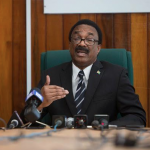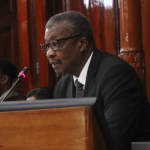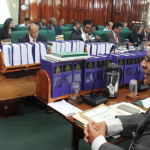
By Ravin Singh
One of the government’s legal challenges to the outcome of the December 21 no-confidence vote by the legislature, offers an opportunity for uncertainty to be removed in the interpretation of what constitutes an absolute majority.
This was the contention of Leader of Government Business in the National Assembly, Prime Minister Moses Nagamootoo, on the sidelines of Thursday’s sitting of the House.
A 33-32 vote in favour of the Parliamentary Opposition gave it, what it believed to be a majority for passage of its no-confidence motion against the coalition government.
However, the government failed in convincing the Speaker to review the vote, and is now making attempts to challenge the outcome of the vote in court, by advancing the argument that 34, and not 33 votes were needed for the successful passage of the motion.
That proposition was first highlighted by prominent Attorney, and former politician Nigel Hughes.
The constitution stipulates that a majority vote is needed for a no-confidence motion to be carried, and according to Hughes, a majority would be half of the elected representatives plus one. That would therefore take the required number to 33.5, which Hughes believes must be rounded up to 34.
The last two General Elections saw the opposition and government, controlling the legislature by a one seat majority. In 2011, the combined opposition controlled the House with 33 seats, while the government secured 32. In 2015, the government secured 33, and the opposition 32.
For this reason, the PM believes that such an occurrence is likely to repeat itself when the next General Elections are held.
“…we have elections down the line; 2020 it is constitutionally due. Suppose it produces the same 32-33 results? You’re still in a quandary and a state of uncertainty” he told Reporters Thursday evening.
PM Nagamootoo said that what the Speaker decided to do was send the matter to court to have a definitive ruling and unambiguous interpretation of the constitution, to prevent a repeat and eliminate the chances of an elected government being removed prematurely.
These conditions, he suggested, were not conducive for democracy to thrive.
“Democracies cannot be fragile. Democracies cannot be unstable. Democracy cannot be uncertain. What is happening here today, is that we have some challenges, but it offers us a tremendous opportunity to revisit our supreme law, the constitution, and to see what this constitution is saying” the Prime Minister shared.
Should this not be achieved, he predicted that a “cycle of instability” will continue, weakening the government, thereby causing confusion.

















You must be logged in to post a comment Login